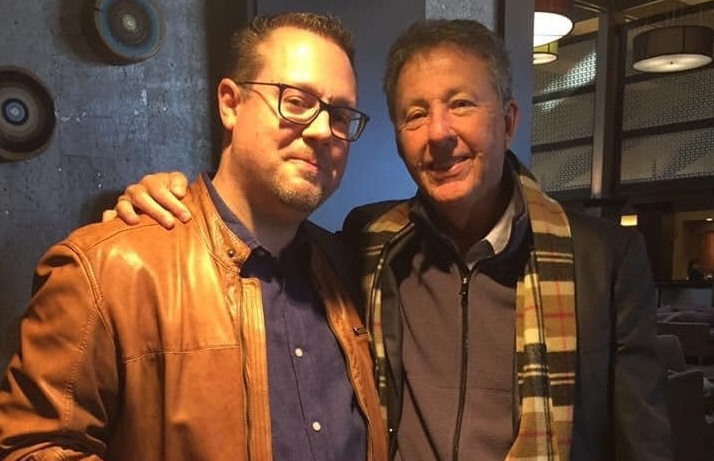
Since he died earlier in June 2024, many words have been spoken about Marc H. Ellis (1952–2024). He was a tireless advocate for Palestinian rights and a tireless critic of the Jewish and Christian thinkers who, to protect their self-interested arrangements, justified the subordination of Palestinian lives. The combination of his early insights into the structure of post-Holocaust thought and political arrangements, along with his dogged refusal to accommodate himself to more moderately palatable perspectives, won Ellis an admiring audience of readers interested in understanding and resisting the theopolitical matrix of ideas and commitments sustaining the tragedy of Israel and Palestine. At the same time, those prophetic stances won him disdain and vitriol from the Jewish and Christian defenders of that version of the post-Holocaust global order.
That’s why I couldn’t wait to study under him. I had the privilege of learning post-Holocaust ethics and Jewish-Christian relations while Prof. Ellis (I still called him that even after earning the PhD) was still directing the Center for American & Jewish Studies at Baylor University.
I first met Prof. Ellis during an event organized by my denomination, the Evangelical Lutheran Church in America (ELCA), in early 2003. I was in my final year of seminary, completing studies toward becoming an ELCA pastor. Building on an additional MA I had completed in Islamic Studies, I had made my first visit to Palestine/Israel in November 2002, taking part in an International Solidarity Mission (ISM) olive harvesting program in the West Bank village of Kafr Qaddum. This trip also involved blocking construction crews building the first sections of the Israeli “Separation Barrier” near Jayyous. Rachel Corrie, another ISM volunteer from the U.S., was murdered under the blade of an armored Israeli bulldozer on March 16, 2003 while seeking to prevent human rights abuses in the Gaza border town of Rafah.
We met just after Prof. Ellis completed a public dialogue in a living room setting with three Palestinian Christians, a group including Rev. Dr. Munib A. Younan, at the time Bishop of the Evangelical Lutheran Church in Jordan and the Holy Land. The tone and content of the conversation got my attention and immediately won me over. Up to that point, I had not heard a constructive, respectful conversation in which a Jew and a Palestinian consciously recognized one another’s humanity. Moreover, I was surprised that Ellis was challenging Bishop Younan (with whom I have now worked for decades) to move beyond calling for the implementation of a two-state solution. Ellis was recognizing something that far deeper and more final was already afoot with the Zionist project.
In this heady time of teach-ins against the impending U.S. invasion of Iraq and concern for a just resolution to the Second Intifada, I was immediately drawn to Ellis’s combination of academic rigor, forthright speech, and uncompromising principles. I soon found myself in Waco, Texas, beginning PhD studies at Baylor University. As several other students—Santiago Slabodsky and Jessica Wai-Fong Wong among them—can attest, being Ellis’s student was far more than a classroom learning experience. We were regularly welcomed into the Ellis home, where we hosted film screenings, engaged in raucous debates, and shared intimate Shabbat meals. I went to Waco to learn Prof. Ellis’s ideas; what I received was a welcome into his life and his network of relationships.
Prof. Ellis utilized his relationships to create meaningful experiences with students. Some of those experiences—for example, with renowned liberation theologian Gustavo Gutiérrez, who we hosted for a Rosh Hashanah retreat—were filled with warmth and mutual admiration. Other visits to the Center ended less harmoniously. One time, the special appearance of one of the founders of Rabbis for Human Rights ended in acrimony and name-calling. These moments, I think, are when I learned the most from—and about—Prof. Ellis. Sometimes, I experienced those moments directly.
More than once, I was on the receiving end of what I would describe as Ellis’s incisive skepticism. He operated with a hermeneutics of suspicion similar to that described by African American theologians like Mitzi J. Smith and Josiah Ulysses Young. As with Smith and Young, Prof. Ellis’s suspicion was especially piqued when assessing politically progressive Christians like me.
In the period immediately following the Second Intifada, this suspicion harmed his relationships with denominations like the ELCA and Presbyterian Church, USA, which were seeking to craft policy statements that would “do the right thing” in relation to Palestinians without jeopardizing their carefully crafted interfaith relationships with Jewish organizations.
I learned the most from Ellis at this nexus of interests: Israel, Palestine, and post-Holocaust Jewish-Christian relations. In my years of work in that field, even as a denominational representative to the National Jewish-Christian Roundtable Dialogue, I have read no more insightful study than Ellis’s 1990 book, Beyond Innocence & Redemption: Confronting the Holocaust and Israeli Power.
Ellis’s historical method produced several books of enduring quality, as relevant to future generations as they were when first published. In Beyond Innocence & Redemption—his more analytical follow-up to 1987’s Toward a Jewish Theology of Liberation—Ellis took aim at the ways state power corrupted both Christianity and Judaism, but with the specific concern for how the post-Holocaust “ecumenical deal” (a term he coined in 1991 and which he would ruminate on under the theme of “Constantinian Judaism” throughout the rest of his life) between Zionists and the Christian political economy of the North Atlantic led inexorably to the theft of Palestinian land and lives.
As concerned as he was with the moral corruption state power was having on Jews and Judaism, he was deeply offended by Christian attempts to regain both innocence and the possibility of redemption through instrumentalizing support of Jewish empowerment. The skeptical disdain with which he read the liberal Christian Zionism of Paul van Buren and Alice and Roy Eckhardt awaited me as I identified topics for doctoral seminar papers and, eventually, my dissertation.
The first icy reception came when I began a more intensive study of the writings of Dietrich Bonhoeffer. Bonhoeffer (1906–1945) was a Lutheran pastor, theologian, and leader in the Confessing Church movement during the Third Reich who was eventually executed for his role in plots to assassinate Hitler. For Lutheran theologians today, he is little less than a demi-god. Ellis, however, was skeptical. How could a Christian theologian who deployed anti-Jewish categories even in his writings defending Jews (as Bonhoeffer did in his famous April 1933 essay, “The Church before the Jewish Question”) make helpful contributions to post-Holocaust Jewish-Christian relations? He was convinced that Bonhoeffer, at the time recently denied the status of “Righteous among the Gentiles” at Yad Vashem, while an interesting figure of resistance, was too convenient (and anomalous) a hero.
As concerned as Ellis was with the moral corruption state power was having on Jews and Judaism, he was deeply offended by Christian attempts to regain both innocence and the possibility of redemption through instrumentalizing support of Jewish empowerment.
I persisted in the topic, continuing to write not for the grade in a seminar paper but for Ellis’s approval. He eventually took my point, which was published as my first academic article. In the intervening years, however, though I have remained committed to studying Bonhoeffer, I have most often done so with a focus on his limits. Gutiérrez, for instance, points out that Bonhoeffer demonstrates precious little class awareness, much less consciousness, although he offers grace because his liberationist forebear was cut down in his prime. Recently, I revised my initial article on Bonhoeffer with greater attention paid to Emil Fackenheim’s critical assessment and was pleased to be able to share that with Prof. Ellis while he was already ill but not yet unable to read. Toward the end of his life, it seems, our perspectives began to more explicitly converge.
I again encountered Prof. Ellis’s skepticism when I began honing in on my dissertation topic: Christian Zionism. He was disinterested since, at the time, the phenomenon appeared to make only marginal contributions to U.S. foreign policy (despite my proselytizing to drum up academic interest in the topic in the first decade of this century, John Mearsheimer shared Ellis’s assessment). The core of Ellis’s skepticism, it’s now clear, was with my motives: was I simply attempting to criticize evangelical fundamentalists with the hope of proving my own form of Christianity more informed, more ethical, more innocent, with a greater chance of redemption? Was I willing to follow the analytical trajectory of his friend, Rosemary Ruether, in also critiquing “liberal” Christian Zionism?
Again, his skepticism (along with more historiographic discipline) contributed toward a more incisive, analytical, and historically grounded project than most studies of Christian Zionism had produced up to that point. Working with Prof. Ellis meant that my approach to Christian Zionism offered no glib light at the end of the tunnel, only the recognition that an ideology developed contemporaneously with Anglo-American modernity itself would not be easily confronted or defeated. Nevertheless, standing on the outside of that mainstream, the prophetic critique must be raised no matter the consequences.
The core of Ellis’s skepticism, it’s now clear, was with my motives: was I simply attempting to criticize evangelical fundamentalists with the hope of proving my own form of Christianity more informed, more ethical, more innocent, with a greater chance of redemption?
Although never leaving behind my concerns for post-Holocaust Jewish-Christian-Muslim relations and justice in Israel and Palestine, my academic research and writing has begun focusing on Critical Race Theory (CRT). As I have researched both the historical foundations and defined tenets of CRT, I have been struck by the movement’s commitment to what Derrick Bell called “racial realism.” For Bell, this realism resulted from his awareness that racism was a permanent component of the United States. When faced with that realist outlook, one must make a choice. If the struggle against racism is a permanent structural feature, do we give up and give in, or do we continue to struggle and fight even if the odds of victory may be near zero? For Bell and the prophetic Black church community from which he came and with which he identified throughout his life, the choice was to fight, even with the meager tools at our disposal.
In the same way, Beyond Innocence & Redemption closes by looking forward to the fiftieth anniversary of Israel’s founding in 1998 by which time, Ellis writes, a choice to either “continue the expansion and militarism and its disastrous results for Palestinians and Jews, or to change radically and embark on a new road” will have been made. “The task before us thus is neither soothing nor encouraging,” Ellis wrote in 1990 of this bleak forecast. “Only a confrontation with state power and the legitimating force of that power—Zionism and Holocaust theology—hold forth the prospect of a faithfulness that is Jewish in context and efficacious in reality” (193).
This prophetic spirit of confrontation, the same spirit I identify in Dietrich Bonhoeffer and in Derrick Bell, is what I learned most from Prof. Ellis. I am saddened that he has left us, and in such a key moment in global history (and, as he would remind us, in the particularity of Jewish history), a moment when Zionism’s trajectory is wreaking ever more “disastrous results for Palestinians and Jews.” Let us together continue to travel down that new road Prof. Ellis, alongside so many others, sought to show us.

